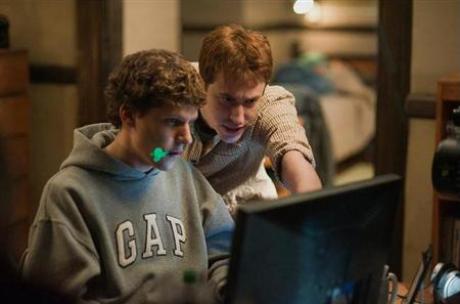


LOS ANGELES - Columbia Pictures' fall hopeful "The Social Network" passed two crucial hurdles during the weekend.
The first was opening No. 1 at the domestic box office. The other was a smaller but no less telling test: pleasing an early audience of members of the Academy of Motion Picture Arts and Sciences, who vote for the Academy Awards.
As general audiences sampled director David Fincher and screenwriter Aaron Sorkin's take on the origins of Facebook, a large group of Academy voters -- including actors Angie Dickinson and Robert Forster and "Little Miss Sunshine" producer Ron Yerxa -- settled into an 8 p.m. screening Saturday at the lush Samuel Goldwyn Theater at the Academy's Beverly Hills headquarters. The 1,012-seat theater was packed with members and their guests, many, but not all, playing on the back nine of life -- all of which made the screening notable.
Critics' takes on the film so far have been almost universally positive (some extremely so), with encouraging predictions about the movie's Oscar prospects. But while younger audiences were expected to show up to get a peek at the movie's zeitgeist-y content, a Hollywood-sign-size question mark has hung over the reactions from older voters unlikely to connect as readily to the material.
If Saturday's early look is any indication, the movie has made quite a few friends in that demographic, too."I love it," said one older person, who described the film as "a story of winning at all costs and its consequences."
A woman in her 80s echoed the sentiment. "It broke my heart," she said. "It's a story of friendship and betrayal."
Their connection to the material seemed to bypass the real-life historical context of Facebook's creation and instead centered on the tragic universality of the shattered friendship at its center.
"If you haven't been betrayed, you haven't lived, they say," another viewer said.
A FEW GRUMBLES
Those with a less positive view of the film grumbled about its two-hour length, and others griped about having "trouble with the postmodern structure." Younger audiences growing up with film in the post-"Pulp Fiction" era tend to find that kind of forward-and-back rhythm more energizing than challenging.
In general, the dreaded generational split was not in evidence. From the whirlwind first scene, in which Jesse Eisenberg, as Facebook creator Mark Zuckerberg, jousts with Rooney Mara, as his besieged college girlfriend in a campus bar, the crowd was laughing right along. And the majority of the people in the audience stayed through the credits.
One multigenerational family in the lobby after the screening consisted of a woman in her 30s, her father and her grandmother. They all gave the movie an enthusiastic thumbs-up, with the grandmother saying, "I don't think it's a generational question at all."
Also drawing positive comments were the performances of Eisenberg and Andrew Garfield, as Facebook co-founder Eduardo Saverin ("Did you know he is English? You can't take your eyes off him," one viewer said). The jury was more split on Timberlake.
Even as the film's first-weekend gross came in under many watchers' predictions, its opening haul represents about half the project's production budget. Long legs at theaters not only will throw the studio's bottom line into the black, but it could keep awards momentum going for what is shaping up to be one of the strongest contenders for this year's biggest prizes.
And it will need it, if this crowd was representative of the awards struggle ahead. "The King's Speech," the Weinstein Company drama starring Colin Firth that has been drawing raves since its first festival screenings a month ago in Telluride and Toronto, was on the audience's mind even Saturday night.
One Academy veteran admitted that "Speech's" traditional elements -- it's a British period drama about a royal overcoming a personal obstacle at a time of war -- "hits the sweet spot of Oscar voters."
When approached about the film, one woman exclaimed, "Oh, 'King's Speech!' That's the one that's going to win the Oscar!"
She hadn't seen it yet.